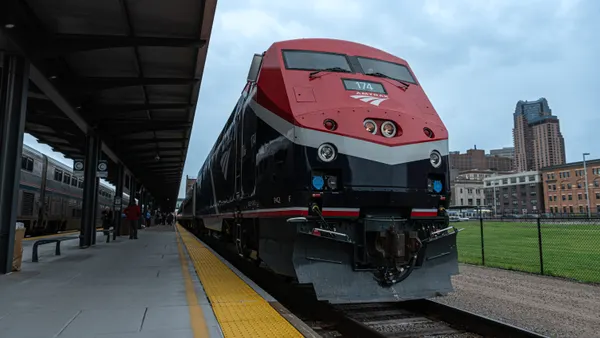Dive Brief:
- New York City will extend its cap on new for-hire vehicle licenses in a bid to boost taxi and ride-hailing driver pay and reduce congestion, Mayor Bill de Blasio announced Wednesday. The cap, originally passed by city council last year, was set to expire in August.
- Additionally, the city is capping how long for-hire vehicle companies can allow drivers to cruise without passengers in the core of Manhattan, requiring companies to limit cruising to 31% of the time they are on the road by August 2020. The cap on the practice also known as "deadheading" is in effect between 6 a.m. and 11 p.m. on weekdays and 8 a.m. to 11 p.m. on weekends.
- All told, de Blasio said the two policies are estimated to cut congestion enough to increase evening rush hour speeds by up to 10%.
Dive Insight:
The moves mark another step in the city’s crackdown on ride-hailing companies, which have caused significant turmoil in the taxi market. The city’s first in the nation regulations on ride-hailing vehicles have already shown impacts on driver pay; according to city statistics, between Feb. 1 and May 19, drivers took home an additional $172 million compared to what they would have before the standards went into effect. All told, drivers should see an estimated pay increase of $10,000 per year. The extended license cap should further help existing drivers by limiting competition.
The city also says that capping drivers and reducing cruising will have a measurable impact on congestion. A new report, called for in the regulations last year, finds that for-hire vehicles make up nearly 30% of all traffic in Manhattan, and cars spend as much as 40% of their time empty, searching for passengers.
The license cap does not apply to wheelchair-accessible vehicles (WAVs) or fully electric vehicles (EVs), in a bid to incentivize a cleaner and more accessible fleet.
Both Uber and Lyft, the two largest companies affected by the city’s actions, expressed dismay at the rulings. Uber spokesman Harry Hartfield said in an email that the cap “will create another medallion system — the same kind that bankrupted drivers and enriched lenders,” in part by raising the cost of rental vehicles for drivers. Lyft spokeswoman Campbell Matthews said “further restrictions on ride-share will result in fewer rides and lower earnings.” Lyft said that companies and the city should have more time to review the impact of the temporary cap before any new rules are instituted.
Additionally, the city announced policies to help drivers who currently hold expensive taxi medallions. Owners no longer have to pay $1,100 every two years to renew, and the city is now offering a driver assistance center that will include advocacy, financial counseling and debt restructuring assistance. The steps come after a New York Times investigation into the medallion system, and after a rash of suicides by taxi drivers.











